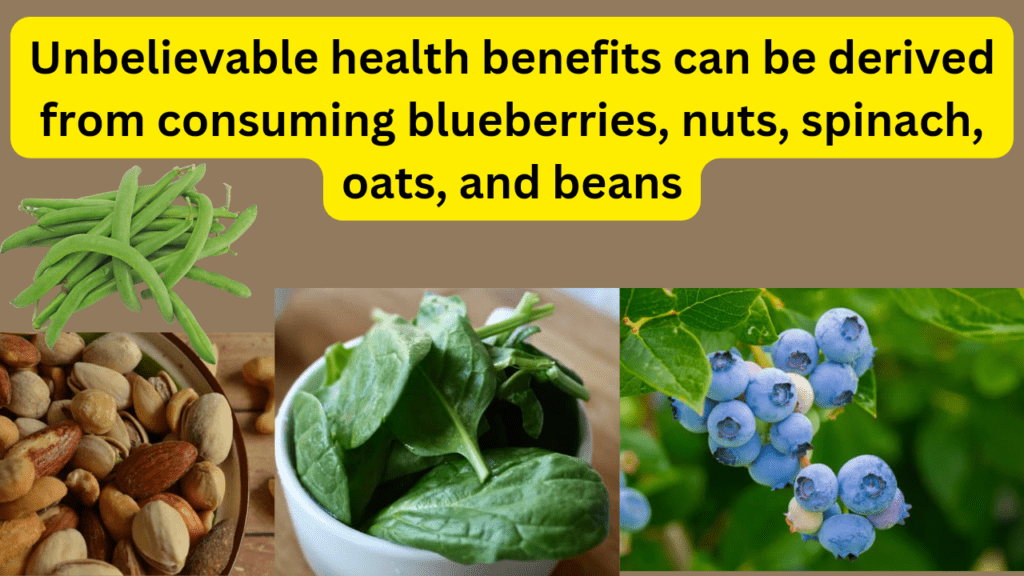Here you will learn about the incredible benefits can be derived from consuming blueberries, nuts, spinach, oats, and beans.

Centuries ago, Hippocrates wisely said, “Let food be thy medicine.” Today, as the world places a stronger emphasis on holistic health, these words remain ever relevant. The foods we eat are under closer scrutiny than ever, as we recognize their profound impact on our overall well-being.
Among the nutritional superstars that have emerged in this spotlight are blueberries, nuts, spinach, oats, and beans.
These seemingly ordinary ingredients offer extraordinary health benefits, from boosting brain function to protecting the heart and promoting overall vitality.
Let’s explore the multifaceted advantages that can be derived from incorporating these foods into our diet.
Blueberries The Brain Boosters
Often referred to as “brain food,” blueberries are rich in antioxidants, specifically flavonoids, which have been associated with improved cognitive function and memory.
These tiny, vibrant fruits are a treasure trove of vitamins, particularly vitamin C and vitamin K, both of which support brain health.
Furthermore, blueberries are known for their anti-inflammatory properties, which can protect the brain from age-related cognitive decline.
The potent antioxidants in blueberries help combat oxidative stress, reducing the risk of neurodegenerative diseases like Alzheimer’s.
Nuts: Nature’s Protein and Healthy Fats
Nuts, including almonds, walnuts, and cashews, are nutrient-dense powerhouses. Packed with protein, fiber, and healthy fats, they offer a variety of health benefits.
First and foremost, nuts can help maintain a healthy weight due to their satiating effect, reducing overall calorie intake.
The monounsaturated and polyunsaturated fats in nuts support cardiovascular health by lowering “bad” LDL cholesterol levels.
Nuts are also rich in essential nutrients like magnesium, potassium, and vitamin E, all of which contribute to optimal heart function.
Spinach: A Nutrient-Rich Leafy Green
Spinach are rich in vitamins A, C, and K, as well as a variety of essential minerals. It is a key player in maintaining bone health and strong immune function.
The high concentration of antioxidants, such as lutein and zeaxanthin, found in spinach supports eye health by reducing the risk of age-related macular degeneration.
Furthermore, spinach’s wealth of dietary fiber aids in digestion and helps manage blood sugar levels, making it an ideal choice for those with diabetes.
Oats: The Versatile Whole Grain
Oats, whether enjoyed as oatmeal, muesli, or in baked goods, are a versatile and heart-healthy whole grain.
They’re a superb source of soluble fiber, beta-glucans, which are renowned for their cholesterol-lowering effects.
Consuming oats regularly can help reduce the risk of heart disease and maintain healthy blood pressure.
It also provide a steady release of energy due to their low glycemic index, making them an excellent choice for sustained energy throughout the day.
Beans: The Protein-Packed Powerhouses
Beans, such as black beans, lentils, and chickpeas, are excellent sources of plant-based protein, which makes them essential for vegetarians and vegans.
This plant-based protein is low in saturated fat, contributing to heart health by reducing the risk of elevated cholesterol levels.
Moreover, it’s are a fantastic source of dietary fiber, which aids in digestive regularity and helps control blood sugar levels.
They’re also loaded with vitamins and minerals like folate, iron, and potassium, promoting overall well-being.